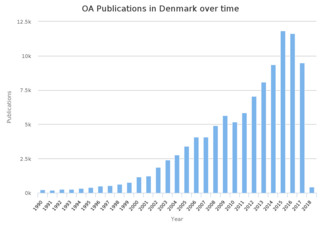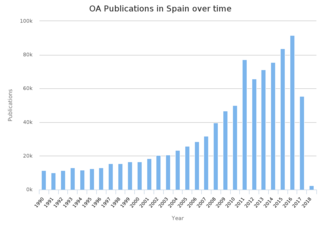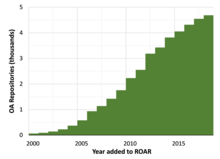
Open access (OA) is a set of principles and a range of practices through which research outputs are distributed online, free of access charges or other barriers. Under some models of open access publishing, barriers to copying or reuse are also reduced or removed by applying an open license for copyright.

Self-archiving is the act of depositing a free copy of an electronic document online in order to provide open access to it. The term usually refers to the self-archiving of peer-reviewed research journal and conference articles, as well as theses and book chapters, deposited in the author's own institutional repository or open archive for the purpose of maximizing its accessibility, usage and citation impact. The term green open access has become common in recent years, distinguishing this approach from gold open access, where the journal itself makes the articles publicly available without charge to the reader.
An open-access mandate is a policy adopted by a research institution, research funder, or government which requires or recommends researchers—usually university faculty or research staff and/or research grant recipients—to make their published, peer-reviewed journal articles and conference papers open access (1) by self-archiving their final, peer-reviewed drafts in a freely accessible institutional repository or disciplinary repository or (2) by publishing them in an open-access journal or both.
OpenDOAR: Directory of Open Access Repositories is a UK-based website that lists open access repositories. It is searchable by locale, content, and other measures. The service does not require complete repository details and does not search repositories' metadata.

In Portugal, the first open access initiatives were carried out by the University of Minho with the creation of RepositóriUM in 2003 and the definition of an institutional policy of self-archiving in 2004. In the following years began SciELO Portugal, for the publication of open access journals, and new repositories in several higher education institutions. The Open Access Scientific Repository of Portugal (RCAAP) launched in 2008.

Open access to scholarly communication in Denmark has grown rapidly since the 1990s. As in other countries in general, open access publishing is less expensive than traditional, paper-based, pre-Internet publishing.

Open access to scholarly communication in Germany has evolved rapidly since the early 2000s. Publishers Beilstein-Institut, Copernicus Publications, De Gruyter, Knowledge Unlatched, Leibniz Institute for Psychology Information, ScienceOpen, Springer Nature, and Universitätsverlag Göttingen belong to the international Open Access Scholarly Publishers Association.

Open access to scholarly communication in Italy has grown since the early 2000s. During an academic conference in Messina in November 2004, Italian universities joined the Berlin Declaration on Open Access to Knowledge in the Sciences and Humanities, in Italy thereafter known as the "Declaration of Messina".

In Belgium, open access to scholarly communication accelerated after 2007 when the University of Liège adopted its first open-access mandate. The "Brussels Declaration" for open access was signed by officials in 2012.

Open access to scholarly communication in Austria has developed in the 2010s largely through government initiatives. The Austrian Science Fund and Universities Austria launched the "Open Access Netzwerk Austria" in 2012 to coordinate country-wide efforts. The "E-Infrastructures Austria" project began in 2014 to develop repositories. The international advocacy effort "OpenscienceASAP – Open Science as a Practice" is based in Austria.

In France, open access to scholarly communication is relatively robust and has strong public support. Revues.org, a digital platform for social science and humanities publications, launched in 1999. Hyper Articles en Ligne (HAL) began in 2001. The French National Center for Scientific Research participated in 2003 in the creation of the influential Berlin Declaration on Open Access to Knowledge in the Sciences and Humanities. Publishers EDP Sciences and OpenEdition belong to the international Open Access Scholarly Publishers Association.

In Spain, the national 2011 "Ley de la Ciencia, la Tecnología y la Innovación" requires open access publishing for research that has been produced with public funding. The first peer-reviewed open access Spanish journal, Relieve, began in 1995. Publishers CSIC Press and Hipatia Press belong to the international Open Access Scholarly Publishers Association.
Open access scholarly communication of Norway can be searched via the Norwegian Open Research Archive (NORA). "A national repository consortium, BIBSYS Brage, operates shared electronic publishing system on behalf of 56 institutions." Cappelen Damm Akademisk, Nordic Open Access Scholarly Publishing, University of Tromsø, and Universitetsforlaget belong to the Open Access Scholarly Publishers Association. Norwegian signatories to the international "Open Access 2020" campaign, launched in 2016, include CRIStin, Norsk institutt for bioøkonomi, Norwegian Institute of Palaeography and Historical Philology, Norwegian University of Science and Technology, Oslo and Akershus University College of Applied Sciences, University of Tromsø, University of Bergen, University of Oslo, and Wikimedia Norge.
Open access to scholarly communication in Sweden is relatively widespread. In 2010 the Swedish Research Council began requiring its grantees to make research results available in open access form. Lund University Libraries and Stockholm University Press belong to the international Open Access Scholarly Publishers Association.
Open access scholarly communication of Ireland can be found by searching "RIAN," a national portal maintained by the Irish Universities Association.
In Ukraine, a 2007 law requires open access publishing of research created through public funding. In January 2008, Ukrainian, Belarusian, and Russian academics issued the "Belgorod Declaration on open access to scientific knowledge and cultural heritage." Ukrainian academics issued another statement in June 2009 in support of open access.

Open access scholarly communication of Greece is preserved in repositories maintained by several academic institutions.
Open access to scholarly communication in Hungary has developed in recent years through digital repositories and academic publishers, among other means. In 2008 several academic libraries founded the Hungarian Open Access Repositories (HUNOR) consortium.

In India, Open Access movement started in May 2004, when two workshops were organized by the M S Swaminathan Research Foundation, Chennai. In 2006, the National Knowledge Commission in its recommendations proposed that "access to knowledge is the most fundamental way of increasing the opportunities and reach of individuals and groups". In 2009, the Council of Scientific & Industrial Research (CSIR) began requiring that its grantees provide open access to funded research. In 2011, the Open Access India forum formulated a draft policy on Open Access for India. Shodhganga, a digital repository for theses, was established in 2011 with the aim of promoting and preserving academic research. The University Grants Commission (UGC) made it mandatory for scholars to deposit their theses in Shodhganga, as per the Minimum Standards and Procedure for Award of M. Phil./Ph.D. Degrees Regulations, 2016.Currently, the Directory of Open Access Journals lists 326 open access journals published in India, of which 233 have no fees.
In Canada the Institutes of Health Research effected a policy of open access in 2008, which in 2015 expanded to include the Natural Sciences and Engineering Research Council and Social Sciences and Humanities Research Council. The Public Knowledge Project began in 1998 at University of British Columbia. Notable Canadian advocates for open access include Leslie Chan, Jean-Claude Guédon, Stevan Harnad, Heather Morrison, and John Willinsky.












